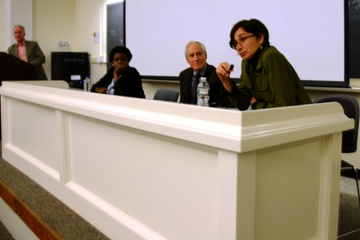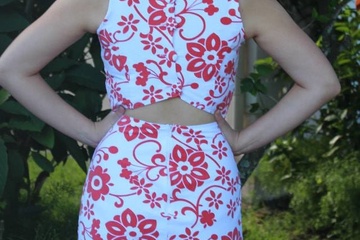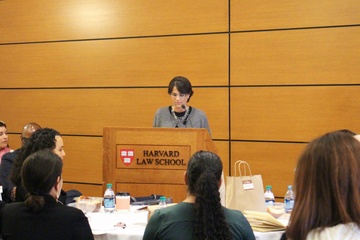At the Museum of Fine Arts “Monuments to Us” exhibit, the usual Friday night foot traffic is interrupted by an array of tables in a U-shaped formation. A hodgepodge of people occupy these seats—some young couples on date night, some old friends on an outing, and some participants with only curiosity as their company. Among them flits Aram Han Sifuentes, handing out colorful string and lending instruction as she sees fit. With her scissors-emblazoned shirt and rainbow eyeliner, she runs this workshop with ease.
To the normal museum-goer, this scene could raise questions ranging from, “Is this an Arts and Crafts table for adults?” to “Is this a group of local citizens and non-citizens learning how to embroider the 100 questions and answers of the United States Naturalization Test?” The latter may seem outlandish at first, but some of the workshop participants otherwise wouldn’t have learned how many members are in Congress (spoiler alert: the answer is 535).
Sifuentes is an Asian-American artist who works with a variety of media to create socially conscious art, often with an interactive component. Fittingly, few things are more interactive than spending a Friday night sitting threading a needle among a circle of strangers. Sifuentes first got the idea for this project when she herself was studying for the citizenship test. She has been sewing since she was six years old, so embroidering samplers seemed like the natural way to study. “I needed to study for the citizenship test, so I started stitching them and then thinking that it would be cool if other people did it with me,” Sifuentes says with a laugh. Different people contribute to each sampler, and when one is completed, she sells the finished project for $725—the price to apply for naturalization—so that she can donate the money to someone who needs it.
Sifuentes has been incorporating sewing into her artwork for years. Her recent exhibit, titled “Travelling Protest Banner Lending Library,” came to life after the outcome of the 2016 U.S. presidential election. As a non-citizen and a new mother at the time, she didn’t feel safe attending protests, but still wanted to have an impact. So, she decided to embroider protest banners and make a lending library for them, accepting banner donations so those who feel unsafe attending a protest can still participate. “Make a banner, donate it, and someone else can take it out,” Sifuentes says.
{shortcode-f8d30c8b160506af1fdcb12647b2cb404a3c4bb7} After Sifuentes’s family immigrated to the U.S. from Korea when she was five years old, her mother became a seamstress and often brought her work home. Sifuentes hopes that, by participating in the workshop, people can see the significance that sewing holds as a practical skill and an entertaining pastime, as well as a symbol of immigrant labor. “I always see sewing as linked to my identity and my experience of being an immigrant,” Sifuentes says.
The workshop is open to anyone who wants to learn more about naturalization, regardless of citizenship status. As people sit around, some struggling while others sew question after question with ease, Sifuentes begins to quiz the group on different questions one might find on the naturalization test. Most people answer quickly and correctly to “Who vetoes bills?”
But that confidence is shaken when Sifuentes works through the list, getting down to the more obscure questions that require specific amendment numbers and ratification years. At these moments, even the most vocal students fall silent, leaving the K-pop music playing in the background to echo throughout the museum hall. It is during these instances that Sifuentes hopes workshop participants think deeply about the types of challenges hopeful citizens encounter on the naturalization test, in order to ask questions like “Is this fair? Is this a good assessment of who is worthy of becoming a citizen?”
Not every person will complete an entire sampler, or even an entire question. Yet Sifuentes encourages participants to write their names and ages in the corner of every square they contribute to, creating a genealogy of seamstresses that continues with the sampler. Many of her projects like the “Protest Banner Lending Library” are ongoing, yet Sifuentes still has ideas for the future. She plans to revamp and expand the “Official-Unofficial Voting Station: Voting for All Who Legally Can't” for the 2020 elections. Also, she aims to continue her “serious, but also very silly and political” artwork with "Put it on Blast, Call it Out and Label it," a sticker book with entries like “This is sexist,” or “This is cultural appropriation.” Her goal is to juxtapose calling out problematic behavior with “kitsch and tacky” images of unicorns and “things that make us laugh,” she says.
In a quiet moment, Sifuentes kneels down to talk to us and tries to teach us how to stitch properly. While it takes us over an hour to shoddily embroider about 10 words, she seems to do 10 per minute, effortlessly sewing words at a speed we could only dream of. Looking around at the paintings and sculptures that adorn the walls of the gallery, she says, “I think it's exciting to be sewing in this space because a lot of people look at these artworks on the walls, and that's what they think art is. But to have an activity like this and to also see it in this kind of space—hopefully people understand that art can also look this way.”




